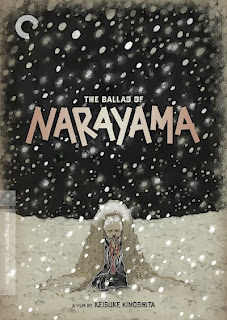
"The Ballad of Narayama" could be a Japanese film of nice beauty and chic ruse, telling a story of surprising cruelty. What an area it exposes between its origins within the kabuki vogue and its subject of starvation in an exceedingly mountain village! The village enforces a convention of carrying those that have reached the age of seventy up the facet of mountain and abandoning them there to die of exposure.
Keisuke Kinoshita's 1958 film tells its story with deliberate ruse, exploitation associate elaborate set with a path beside a effervescent brook, matte pantings for the backgrounds, mist on dewey evenings, and lighting that drops the backgrounds to black at dramatic moments then brings up realistic lighting once more. a number of its exteriors use black foregrounds and bloody red skies; others use grays and blues. As in kabuki theater, there's a black-clad utterer to inform U.S.A. what is happening.
This ruse supports a story that contains nice emotional charge. Kinuyo Tanaka plays Orin, a 70-year-old widow whose resignation within the face of her ancient fate is in stark distinction with the behavior of her neighbor Mata (Seiji Miyaguchi), World Health Organization protests violently against his destiny. Their family attitudes ar equally opposed; whereas Orin's son Tatsuhei (Teiji Takahashi) loves his mother and does not have any want to hold her up the versant, Mata's family has already discontinue his food, and he wanders the village as a desperate scavenger; Orin invitations him in and offers him a bowl of rice, that be gobbles ravenously.
In distinction along with her resignation and her son's reluctance to hold out her sentence, Orin's vile grandchild Kesakichi (Danshi Ichikawa) cannot wait to be through with the previous lady, and begins singing a song mocking the actual fact that she retains, at 70, all thirty three of of her original teeth. this can be obsessed by the villagers, World Health Organization hap as a vindictive chorus, their song implying she unbroken her teeth attributable to a contend with demons. desperate to qualify for her doom, Orin bites down laborious on a stone and once they see her once more her mouth reveals bloody stumps.
This harsh imagery contrasts with the way the film is structured around song and dance. though bestowed within the kabuki vogue, it's not supported associate actual kabuki play however on a unique. Kinoshita is correct, I believe, in presenting his story during this conventionalised way; his type permits it to become a lot of fable than narrative, and therefore a lot of supportable.
His sets and backdrops replicate he dynamical seasons with lush beauty: Spring, summer, the red leaves of fall, then the wintry snows on the slopes of Narayama. On the mountaintop, blackbirds perch on snowy crags because the camera uses lateral moves to comb across the desolate landscape. Finally depositing his mother in associate empty place on the mountain, Tatsuhei greets the snow with relief: she is going to freeze a lot of quickly. This he will sing solely to himself, as a result of the journey up the mountain has 3 strict rues: (1) you need to not speak once commencing Narayama; (2) make sure nobody sees you allow within the morning; (3) ne'er relive. His adherence is in distinction with the adventures of the fearful neighbor Mata, World Health Organization seems before long once sure head and foot, dragged complaining by his son ("Don't do this!").
Orin's goodness and resignation ar at the middle of the story. In particuar, notice her kind welcome for Tama (Yuko Mochizuki), a 40-year-old widow she has determined are going to be the best new mate for her widowman son. glorious for her ability to catch trout once nobody else will, she leads Tama through the forest on a foggy night and divulges a secret place to a lower place a rock within the brook wherever a trout is usually to be found. This secret was ne'er discovered to her 1st in-law. She even desires to die before her 1st issue arrives. She desires to free the village from a hungry mouth.
Some can realize Orin's behavior strange. So it is. Perhaps, within the years before long once warfare 2, she is meant in praise of the japanese ability to gift acceptance within the face of the appalling. you'll attach any set of parallels to Kinoshite's parable and create them work, however that looks to suit.
Keisuke Kinoshita (1912-1998) is of a similar generation as Kurosawa. voice communication that concepts sprang quickly into his mind, he rapt between periods and genres, and created forty two films within the 1st twenty three years of his career. He was in real time interested in motion pictures; a movie was shot in his home city once he was in highschool and he ran away to a studio in city. His family created him come back home, however later born its opposition to his career plans. while not a school education, he started humbly as a group lensman, and worked his far, causation in one book once another to the studio chief.
He created dramas, musicals, thrillers, musicals, anything, however he ne'er created another film like "The Ballad of Narayama." In its matter-of-fact juxtaposition of fate and art, it leaves associate unerasable impression. Tatsuhei's second bride Tama tells him: "When we tend to flip seventy, we'll go along up Narayama."
"The Ballad of Narayama" could be a new optical disc unleash within the Criterion assortment. because of Wikipedia for a few of the analysis during this article.